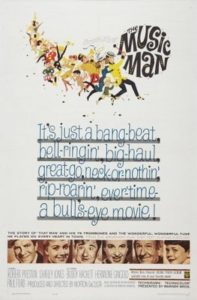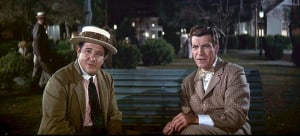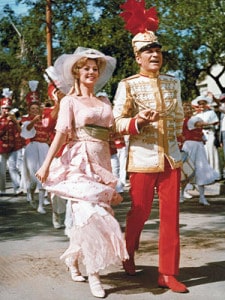
“Ladies and gentlemen, either you are closing your eyes to a situation you do not wish to acknowledge, or you are not aware of the caliber of disaster indicated by the presence of a pool table in your community!” — “Professor” Harold Hill
Aside from all those Hollywood musicals of the early 1930s, particularly those by George and Ira Gershwin after they left Broadway, the 1960s was the greatest decade for the movie musical. Mary Poppins and Funny Girl were two of many, and four were Oscar-winners as Best Picture of their years: The Sound of Music, West Side Story, Oliver! and My Fair Lady. Also from the same decade, The Music Man rated a Best Picture nominee—and possessed a novelty. Among other things, unlike most musicals, the book, music and lyrics were all written by the same man, Meredith Willson.
Set in the summer of 1912 in fictional River City, Iowa, the musical, and now its movie version released as part of a Warner Brothers twenty-title box set, is as full of tuneful songs, exuberant shenanigans, wild humor, preposterous situations and vibrant performances as one could wish. If you like musicals, and feel the need to escape the troubles of this twenty-first century, if only for two hours and a half, this is the musical for you. This is the escape for you!
In the role that moved his fame to the movie screen, [intlink id=”74″ type=”category”]Robert Preston[/intlink] reprises his Broadway stint as “Professor” Harold Hill. The quotes are necessary because he isn’t really a professor—or a graduate of “Gary Conservatory, gold medal, class of nought five,” as discovered by that lovely but suspicious lady librarian, Marian (Shirley Jones). He is not, then, a band instrument salesman? Indeed not. On the train arriving at River City, a fellow passenger asks him his destination. “Wherever the people are as green as the money,” Hill replies.
 With the trusted silence of a friend (Buddy Hackett), now living in the town, who knows all about him, Hill sets out to convince the children’s parents that, to eliminate “corruption” among the young folks—rebuckling knickerbockers below the knee, dime novels in the corncrib, index fingers stained with nicotine, the use of such words as “swell”—they need to fork over money for band instruments and uniforms.
With the trusted silence of a friend (Buddy Hackett), now living in the town, who knows all about him, Hill sets out to convince the children’s parents that, to eliminate “corruption” among the young folks—rebuckling knickerbockers below the knee, dime novels in the corncrib, index fingers stained with nicotine, the use of such words as “swell”—they need to fork over money for band instruments and uniforms.
Of course, he knows nothing about music—can’t play an instrument—but that doesn’t matter as long as he can hornswoggle and distract the townspeople. Just long enough to get his money and then, as he says, “I’ve got it timed down to the last wave of the brakeman’s hand on the last train outta town.” Whenever the school board (The Buffalo Bills, a famous barbershop quartet of stage and TV at the time) ask for Hill’s credentials, he slyly cues them for a song, and while they croon a Gay Nineties-style ditty, “Goodnight, My Ladies” or “Lida Rose,” he slips away.
Hill, however, ends up seriously distracted himself by that lady librarian. After winning a Best Supporting Actress Oscar for her role as a prostitute in Elmer Gantry in 1960, Shirley Jones revisited in The Music Man the sweet, girl-next-door image that had launched her career with Oklahoma! and Carousel. Her voice is likewise sweet, pure and always note-perfect.
Meredith Willson’s songs certainly approach being unique. It is doubtful that any art is ever “unique,” as there is always something else, somewhere, that proves similar, a precursor. But, in contrast with, say, the straightforward, always traditional, pristine style of Richard Rodgers and Oscar Hammerstein II, Willson can sometimes create unusual sound imitations, half-spoken dialogue, physical action or something simply riotous.
 The best example of this originality is “Ya Got Trouble,” where Preston disrupts his singing with extravagant spoken dialogue and rushes about waving his arms and addressing individuals in a crowd. Another “physical” song, with an added play on words, involves the mayor’s wife (Hermione Gingold) leading a group of ladies down a sidewalk. All with bobbing feather hats, they sing in a staccato rhythm, “Pick a little, talk a little, pick a little, talk a little. Cheep, cheep, cheep. Talk a lot, pick a little more.” Their whole chorus, of course, gives the impression, as intended, of parading barnyard hens.
The best example of this originality is “Ya Got Trouble,” where Preston disrupts his singing with extravagant spoken dialogue and rushes about waving his arms and addressing individuals in a crowd. Another “physical” song, with an added play on words, involves the mayor’s wife (Hermione Gingold) leading a group of ladies down a sidewalk. All with bobbing feather hats, they sing in a staccato rhythm, “Pick a little, talk a little, pick a little, talk a little. Cheep, cheep, cheep. Talk a lot, pick a little more.” Their whole chorus, of course, gives the impression, as intended, of parading barnyard hens.
Ron Howard, then eight years old and starring in The Andy Griffith Show, has his big vocal moment in “The Wells Fargo Wagon.” He plays shy Winthrop, Marian’s young brother who has a speech problem and a watery lisp, all comically displayed when he sings, “O-ho the Wellth Fargo Wagon ith a-comin’ now . . . ”
Willson took piano lessons as a youngster, and he incorporates its memory in “Piano Lesson,” which uses a simple scale and, as well, a fragment of the third movement of Beethoven’s Piano Sonata No. 31 in A-Flat, Op. 110. Beethoven’s music is used as source music when Hill instructs the band to “think” the Minuet in G as a way of playing it.
Shirley Jones could have easily closed the show with her two romantic songs, wonderfully rendered, “Goodnight, My Someone” and “Till There Was You.” Closed it, yes, were it not for the film’s now famous signature piece. All the citizens of River City march through town to their new band playing “Seventy-Six Trombones.” The band has its new instruments and bright uniforms—and, thanks to Professor Harold Hill, they play beautifully.
By all means, start any review of WB’s box set of musicals with The Music Man.
Thanks as always to Warner Brothers for the review copy.
My favorite classic movie musical. Those songs really do distinguish themselves from most of the other composers writing at the time… and Robert Preston does such an incredible job as Harold Hill.
Boy oh boy, I haven’t seen this since I was a kid. I really enjoy the music in this film (even though it’s a bit cheesy), and it’s time to watch it again.
I just finished watching this lovely musical. What incredible work must have gone into making this film. In the comments made by TCM host and his guest….. the talent and coreography in this flick are superb. I had lived in Niagara Falls, Ontario for my teen years and remember the Marching Bands competition come to our town in the summers to compete with the best from Canada and USA. Can you imagine seeing 80+ bands march past you? It was always filled with excitement, brilliant colours, wonderfull music, and rising young talent beaming with pride. Let’s hope that the tradition stays alive.